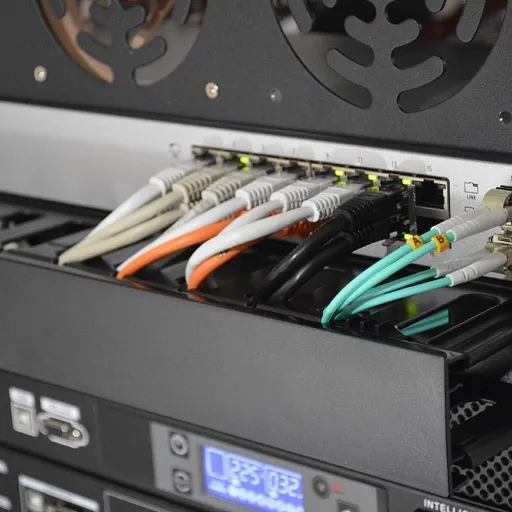
Understanding Supply Chain Compliance Software
Decoding the Essentials of Supply Chain Compliance Software
In the intricate world of global supply chains, compliance software has emerged as a pivotal tool for ensuring smooth operations. This software is designed to help businesses navigate the complex landscape of regulations and standards that govern supply chain activities. By integrating compliance management into their operations, companies can mitigate risks and enhance transparency across their supply chains.
Supply chain compliance software serves multiple purposes. It supports businesses in maintaining product compliance by ensuring that all sourced raw materials and finished products meet the necessary legal and ethical standards. This is particularly crucial in sectors where regulations are stringent, such as pharmaceuticals and electronics.
Moreover, compliance software plays a vital role in risk management. By providing real-time data and insights, it enables companies to identify potential risks, such as forced labor or human rights violations, and take proactive measures to address them. This not only protects the company’s reputation but also contributes to building a resilient supply chain.
Another significant aspect of compliance software is its ability to foster supplier collaboration. By facilitating transparent communication and data sharing, it helps companies work more effectively with their suppliers. This is essential for responsible sourcing and ensuring that all parties adhere to agreed-upon standards.
As businesses continue to expand globally, the need for robust compliance solutions becomes even more critical. Companies are increasingly turning to digital tools to support their compliance efforts, ensuring that they can adapt to evolving regulations and maintain their competitive edge.
For more insights into how automation is transforming supply chain operations, you might find this article on Walmart's automation services evolution particularly enlightening.
The Role of Technology in Modernizing Supply Chains
Transformative Impact of Technology on Supply Chains
In today's fast-paced global market, technology plays a pivotal role in modernizing supply chains. The integration of digital solutions in supply chain management has become essential for enhancing efficiency and ensuring compliance with ever-evolving regulations. As businesses strive for transparency and sustainability, the adoption of compliance software is no longer optional but a necessity.
Leveraging Digital Tools for Enhanced Transparency
Digital tools provide unparalleled support in monitoring and managing supply chains. By utilizing compliance software, companies can achieve greater transparency in their operations, from sourcing raw materials to delivering the final product. This transparency is crucial in mitigating risks associated with forced labor and human rights violations, ensuring responsible sourcing practices are upheld.
Data-Driven Decision Making
Data is at the heart of modern supply chain management. Compliance software enables businesses to harness data for informed decision-making, allowing for proactive risk management and supplier collaboration. With real-time data monitoring, companies can swiftly address potential compliance issues, ensuring product compliance and maintaining a resilient supply chain.
Supporting Sustainable Practices
As global supply chains face increasing scrutiny over their environmental impact, technology offers solutions to support sustainability initiatives. Compliance software aids in tracking the environmental footprint of supply chains, promoting sustainable practices and helping companies meet their sustainability goals. This not only enhances brand reputation but also aligns with consumer demand for eco-friendly products.
Enhancing Supplier Collaboration
Effective supplier collaboration is key to successful supply chain management. Compliance software facilitates seamless communication and collaboration with third-party suppliers, ensuring that all parties adhere to compliance standards. This collaborative approach fosters trust and accountability, reducing risks and enhancing overall supply chain resilience.
For more insights on how technology is revolutionizing industries, explore our article on enhancing accounting firms with advanced IT services.
Challenges in Implementing Compliance Software
Overcoming Barriers in Compliance Software Implementation
Implementing compliance software in supply chains is not without its challenges. As businesses strive for transparency and sustainability, they must navigate a complex landscape of regulations and supplier collaboration. Here, we explore some of the key obstacles companies face when integrating these digital solutions.
- Data Integration and Management: One of the primary challenges is the integration of compliance software with existing systems. Companies often struggle with data management, as they need to consolidate information from various sources to ensure accurate monitoring and reporting. This requires robust data solutions that can support seamless integration.
- Supplier Collaboration: Effective compliance management depends heavily on supplier collaboration. However, aligning global supply chains with diverse suppliers can be daunting. Companies must ensure that all parties are committed to responsible sourcing and adhere to product compliance standards.
- Regulatory Complexity: Navigating the myriad of global regulations is another significant hurdle. Compliance software must be adaptable to different legal frameworks, which can vary widely across regions. This complexity requires diligent risk management to avoid potential legal pitfalls.
- Cost and Resource Allocation: Implementing new software solutions often involves substantial investment. Companies must allocate resources wisely to ensure that the benefits of compliance software outweigh the costs. This includes training staff and maintaining the systems over time.
- Resistance to Change: Finally, organizational resistance can impede the adoption of compliance software. Change management strategies are essential to foster a culture that embraces digital transformation and prioritizes chain diligence.
Despite these challenges, the benefits of compliance software in enhancing supply chain efficiency are undeniable. By addressing these obstacles, companies can build more resilient supply chains that prioritize human rights and sustainability. For those interested in exploring alternatives to traditional methods, consider exploring alternatives that offer innovative solutions.
Benefits of Compliance Software in Supply Chains
Unlocking Efficiency and Transparency
Compliance software offers a multitude of benefits that significantly enhance supply chain efficiency and transparency. By integrating compliance management solutions, businesses can streamline their operations, ensuring that every link in the supply chain adheres to global regulations and standards. This not only minimizes risks but also fosters a culture of responsible sourcing and sustainability.
Streamlined Risk Management
One of the primary advantages of using compliance software is its ability to support comprehensive risk management. With digital tools for monitoring and assessing supplier collaboration, companies can identify potential risks, such as forced labor or human rights violations, before they escalate. This proactive approach to risk management ensures a resilient supply chain that can adapt to global challenges.
Enhanced Data-Driven Decisions
Compliance software empowers businesses with data-driven insights, enabling more informed decision-making. By leveraging real-time data, companies can conduct thorough chain diligence and product compliance checks, ensuring that raw materials and products meet the necessary standards. This level of transparency supply is crucial for maintaining trust with stakeholders and consumers alike.
Facilitating Supplier Collaboration
Effective supplier collaboration is essential for maintaining a smooth and efficient supply chain. Compliance software provides a platform for seamless communication and collaboration between all parties involved, from suppliers to third-party vendors. This fosters a cooperative environment where all stakeholders are aligned in their commitment to compliance and sustainability.
Supporting Sustainable Practices
In today's global supply chains, sustainability is more important than ever. Compliance software aids in promoting sustainable practices by ensuring that sourcing and production processes adhere to environmental and ethical standards. This not only helps companies meet their sustainability goals but also enhances their brand reputation in the eyes of consumers who prioritize ethical consumption.
Case Studies: Success Stories in Supply Chain Compliance
Real-World Applications of Compliance Software
In the realm of supply chain management, compliance software has become an indispensable tool for ensuring transparency and sustainability. Several companies have successfully integrated these solutions to enhance their operations and mitigate risks. Let's explore some notable examples.
Global Retailer Embraces Transparency
A leading global retailer has implemented compliance software to monitor its extensive network of suppliers. By leveraging digital tools, the company ensures that its supply chains adhere to international regulations and standards. This approach not only supports responsible sourcing but also enhances product compliance, reducing the risk of forced labor and human rights violations.
Automotive Industry's Shift to Sustainable Sourcing
In the automotive sector, a major manufacturer has adopted compliance management solutions to oversee its raw materials sourcing. The software provides real-time data on supplier collaboration and chain diligence, allowing the company to make informed decisions. This initiative has resulted in a more resilient supply chain, capable of adapting to global supply disruptions.
Food and Beverage Company's Risk Management Strategy
A prominent food and beverage company has utilized compliance software to enhance its risk management processes. By implementing third-party monitoring systems, the company can swiftly identify potential risks and take corrective actions. This proactive approach has improved the company's overall supply chain efficiency and supported its commitment to sustainability.
Electronics Manufacturer's Focus on Product Compliance
An electronics manufacturer has integrated compliance software to ensure product compliance across its global supply chains. The software facilitates chain compliance by providing detailed insights into supplier practices and sourcing strategies. This transparency supply initiative has strengthened the company's reputation and bolstered consumer trust.
These case studies illustrate the transformative impact of compliance software in various industries. By embracing these digital solutions, companies can navigate the complexities of global supply chains while upholding ethical standards and enhancing operational efficiency.
Future Trends in Supply Chain Compliance Software
Embracing Digital Transformation
The future of supply chain compliance software is closely tied to the ongoing digital transformation across industries. As companies strive for more resilient supply chains, the integration of advanced digital solutions will become paramount. These technologies will not only streamline compliance management but also enhance transparency and sustainability in global supply chains.
Leveraging Data for Enhanced Transparency
Data-driven insights will play a critical role in the evolution of compliance software. By harnessing big data analytics, companies can monitor risks more effectively and ensure product compliance. This will support responsible sourcing and help mitigate risks associated with third-party suppliers. The ability to analyze vast amounts of data will also facilitate better supplier collaboration and chain diligence.
Addressing Global Regulations and Human Rights
As global regulations become more stringent, compliance software will need to adapt to ensure adherence to new standards. This includes addressing issues such as forced labor and human rights within supply chains. Future solutions will need to provide comprehensive support for compliance management, helping companies navigate the complexities of global supply chain regulations.
Innovations in Risk Management
Risk management will continue to be a focal point for compliance software. Future innovations will likely focus on predictive analytics and real-time monitoring to identify potential risks before they escalate. This proactive approach will be essential for maintaining a resilient supply chain and ensuring the integrity of raw materials and products.
Future-Proofing Supply Chains
As the vice president of a leading supply chain company might attest, future-proofing supply chains will require a commitment to continuous improvement and innovation. Compliance software will need to evolve to meet the demands of an ever-changing global market, providing robust solutions that support sustainable and transparent operations.















